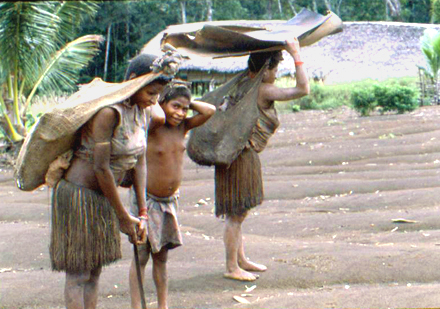
Gebusi society tends to circle around survival incentivized work and relaxation incentivized socialization. Fulfilling primary needs, such as the need for food, shelter and a sense of belonging appears to be natural for the Gebusi. The concept of belonging is demonstrated to researcher Bruce Knauft (and company) on many occasions. Knauft describes generalized reciprocity as he observes gift exchange from neighboring settlers, he views casual conversations between Gebusi women “as they stoke the heath and cook the bananas,” both evidence of the Gebusi’s view on having social balance (31).
“Many hours on most days drift by in relaxation—conversing, eating, and playing with children,” (35).
Despite the laborious work necessary to produce food and shelter “people are still able to spend hours each day socializing or lazing about,” primary functions that go together hand in hand (36). That is, tending to the land, taking care of children, and finding rest; or, as Knauft puts it, ‘produce,’ distribute,’ and ‘consume,’ whereby consumption affords the greatest moment to relax. When described in this fashion, the Gebusi lifestyle is no different than a 1st world routine, for example Northern American activities. One major difference between the Gebusi and the United States, is that the “Gebusi have neither the aggression [nor] status-competition,” however, they do have general support for older generations (37). After trees are felled and natural food sources are depleted in one area “the grandson of the original gardener comes back to plot and recultivates,” the area for future generations (35). This action alone establishes a sense of ownership, an ecological understanding as well as subsistence.
“Though most families maintain small gardens, large ones are also cleared as a communal project,” (33).
This is one of the greatest aspects to Gebusi culture, because it eloquently captures family connectedness alongside community development. At the end of a long day of food procurement, sego tree processing and opportunistic foraging, the Gebusi find ways to “conserve energy and relax,” as oppose to trying to “work harder and improve nutrition only marginally,” like some industrialized society might. The “men sit together and share large bamboo tube pipes,” and smoke tobacco, while the women are absorbed in their own conversations (31). Knauft writes, “we joked with the Gebusi, shared with them, took part in their activities and became part of their world,” confirming the Gebusi’s proficiency in social connectedness and belonging (42).
“Reciprocity has always been the heart of their social life,” – Bruce Knauft (44).
